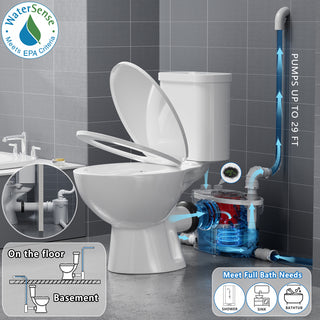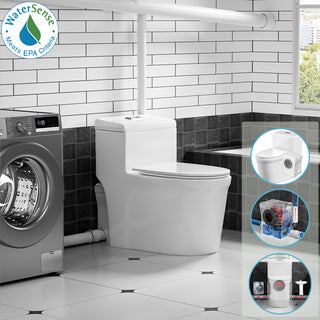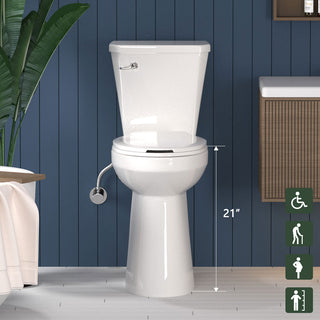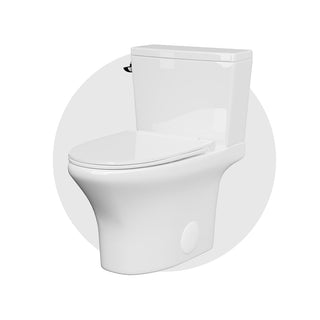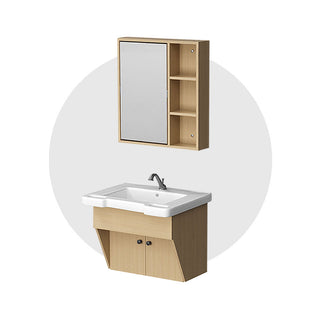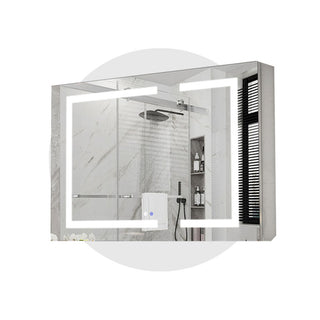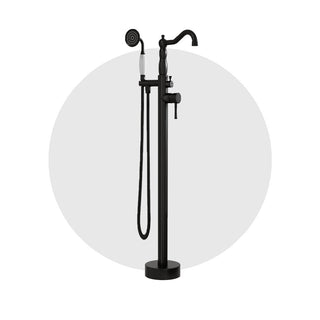If you’re planning to add a bathroom in a basement, attic, or any space far from your home’s main drain line, you might have come across the term "macerator toilet" or "upflush toilet." But are macerator toilets any good? In this article, we’ll take a fair, practical look at the pros and cons, share maintenance tips, and help you decide whether a macerating toilet is the right choice for your home.
How Macerator Toilets Work?
Unlike standard gravity-flush toilets, a macerator toilet has an electric pump with sharp blades that grind up waste into a slurry. This slurry can then be pumped horizontally or vertically through a small-diameter pipe to reach the existing sewage system. That means you can install it in places where traditional plumbing would be too expensive, difficult, or outright impossible.
TIP: The video demonstrates using the Simple Project Macerator Toilet as an example.
Pros of Macerator Toilets
✅ Flexible Installation
Macerator toilets allow for installation in areas below or far from the main sewer line, like basements, garages, or attics.
✅ No Need to Break Concrete
They don’t require breaking floors or creating a deep slope for drainage, saving time and renovation costs.
✅ Space-Saving and Compact Designs
Many units are designed to be compact, making them perfect for small bathrooms and conversions.
✅ Ideal for Additions
They’re commonly used in home additions, rental suites, and other situations where traditional plumbing is impractical.
✅ Modern Improvements
Newer models offer quieter operation, better aesthetics, and improved reliability compared to early designs.
Cons of Macerator Toilets
⚠️ Power Dependency
Since they rely on electricity, macerator toilets won’t work during a power outage. If uninterrupted use is critical, consider a battery backup system.
⚠️ Potential for Clogs
They can clog if non-dissolvable items (like wipes, sanitary products, or excessive tissue) are flushed.
⚠️ Pump Noise
Though quieter than before, some units still produce a noticeable hum during operation.
⚠️ Regular Maintenance
Pumps may need descaling or servicing every few months, especially in hard water areas.
⚠️ Installation Errors Can Lead to Issues
Improper angles or pipe lengths may cause backups or inefficient flushing. Professional installation is strongly advised.
When a Macerator Toilet Is Worth It?
A macerator toilet is absolutely worth considering in these situations:
✔ You need to add a toilet in a basement or attic without easy access to gravity drainage
✔ Remodeling a space where running standard waste pipes is too expensive
✔ You want a temporary bathroom or rental suite with minimum renovation
✔ You live in an older house or converted space without traditional sewer routing
When installed and maintained properly, macerating toilets are highly reliable and user-friendly.
Tips for Daily Use and Maintenance
To get the best performance out of your macerator toilet:
- Only flush toilet paper and human waste. Never flush wipes, cotton balls, feminine products, or grease.
- Use macerator-safe descaler once a month to prevent buildup.
- Listen for unusual pump sounds—a change may signal clogs or wear.
- Run clean water through the system weekly if it’s used infrequently.
- Ensure adequate ventilation to avoid odors.
The Importance of Proper Installation
Incorrect installation is the most common cause of failure. Key installation best practices include:
- Maintaining the right slope and angle for horizontal pipes
- Using the correct diameter for discharge piping
- Ensuring airtight and watertight connections
- Providing access for maintenance and inspection
- Following local plumbing codes and manufacturer instructions
Professional installation helps ensure safety, performance, and longevity.
Macerator Toilet FAQs
Q1: Can I install a macerator toilet anywhere in my house?
Almost anywhere with access to a water source and a power outlet—ideal for basements, attics, and even closets.
Q2: How long do macerator toilets last?
With proper use and maintenance, most macerating units last between 7 to 10 years.
Q3: Are macerator toilets loud?
Modern units are relatively quiet, though some noise is normal during flushing.
Q4: Can I install a macerator toilet system myself?
While DIY is possible, professional installation is highly recommended for best results.
Q5: Do macerating toilets smell?
Not if correctly vented and maintained. Odors usually indicate a ventilation issue or lack of cleaning.
Q6: Do macerating toilets require special toilet paper?
No—standard septic-safe toilet paper is fine.
Q7: What happens during a power outage?
The macerator toilet won’t function, as the pump requires electricity to operate.
Conclusion: Are Macerator Toilets Any Good?
Yes—for the right situation, a macerator toilet is an excellent solution. It allows homeowners and renovators to install bathrooms in places that would otherwise be off-limits. While there are some limitations, the benefits far outweigh them when installed and used properly. If you're looking for a convenient, flexible, and cost-effective bathroom solution, a macerator toilet is absolutely worth considering.


